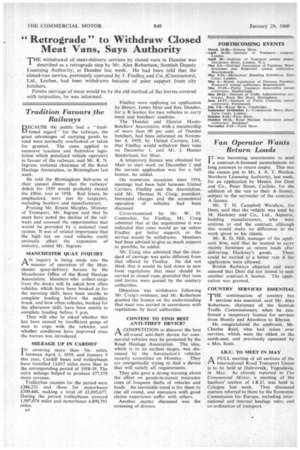Tradition Favours the Railways
Page 38

If you've noticed an error in this article please click here to report it so we can fix it.
D ECAT_T S E the public had a • "tradi tional regard" for the railways, the great advantages of carrying goods by road were normally overlooked or taken for granted. The same applied to excessive taxation and testrictive legislation which penalized vehicle operators in favour of the railways, said Mr. K. N. . Ingram, national chairman of the Road Haulage Association, in Birmingham last week.
He told the Birmingham Sub-area at their annual dinner that the railways' deficit for 1959 would probably exceed the £90rn. loss in 1958. Rail losses, he emphasized,. were met by taxpayers, including hauliers and manufacturers.
Praising Mr. Ernest IVIarpIes, Minister of Transport, Mr. Ingram said that he must have noted the decline of the railways and assessed the opportunities that would be provided by a national road system. It was of related importance that the high tax on road vehicles could seriously affect the expansion of industry, added Mr. Ingram.
MANCHESTER QUAY INQUIRY
AN inquiry is being made into the manner of operation Of the Manchester quay-delivery bureau by the Manchester Office of the Road Haulage Association. Members who collect cargo from the docks will be asked how often vehicles, which have been booked in for the morning shift, have been unable to complete loading before the midday break, and how often vehicles, booked for the afternoon shift, have been unable to complete loading before 5 p.m.
They will also be asked whether this has been caused by insufficient gangs of men to cope with the vehicles, and whether conditions have improved since the bureau was introduced.
MILEAGE UP IN CARDIFF N covering more than 7m. miles, between April 1. 1959_ and January 9 this year, Cardiff buses and trolleybuses have travelled 13,017 miles more than in the corresponding period of 1958-59. The extra mileage helped to produce 177,579 more revenue.
Trolleybus receipts for the period were £386,231 and those for motorbuses' £709,446, making a total of £1.095.677. During the period trolleybuses covered 1,997.074 miles and motorbuses 4.890,791 miles. Findlay were opposing an application by•Messrs. James Muir and Son, Dundee, for a B licence for two vehicles to carry meat and butchers' sundries.
The Dundee and District Master 'Butchers' Association, with a membership of more than 90 per cent. of Dundee butchers, had been informed on November 4, 1959, by United Carriers, Ltd., that Findlay would withdraw their vans on December I, said Mr. J. Hunter Sunderland, for Muir.
A temporary licence was obtained for Muir to start work on December 1 and the current application was for a full licence, he added.
On numerous occasions since 1954, meetings had been held between United Carriers, Findlay and the Association, said Mr. Thomas N. Craig, president Increased charges and the economical operation of vehicles had been discussed Cross-examined by Mr. W. D. Connochie, for Findlay, Mr. Craig admitted that at the negotiations it was indicated that rates would go up unless Findlay got better support, or the service would be withdrawn. Members had been advised to give as much support as possible, he added.
Mr. Craig also admitted that the standard of carriage was quite different from that offered by Findlay. He did not think that it would be laid down in new food regulations that meat should be carried in closed vans, provided that vans and lorries were passed by the sanitary authorities.
Objection was withdrawn following Mr. Craig's evidence, and Mr. Robertson granted the licence on the understanding that meat was carried in accordance with regulations by local authorities.
CONTEST TO FIND BEST ANTI-THEFT DEVICE?
A COMPETITION to discover the best fi all-round anti-theft device for commercial vehicles may be promoted by the Road Haulage Association. The idea, which is in its earliest stages, was discussed by the Association's vehicles security committee on Monday. They are energetically trying to find a device that will satisfy all requirements.
They also gave a strong warning about the effect on goods-in-transit insurance • rates of frequent thefts of vehicles and loads. An inevitable trend is for them to rise all round, and operators with good claims experience suffer with others.
. Another matter discussed was the screening of drivers.






































































































